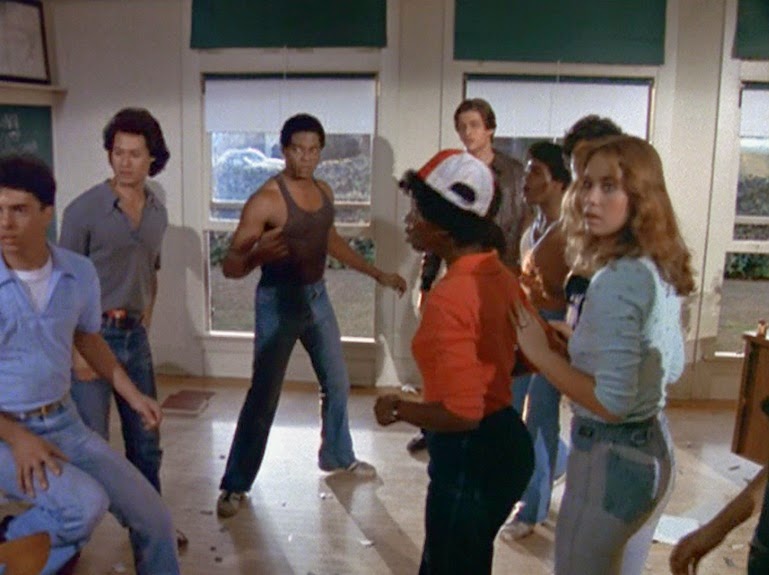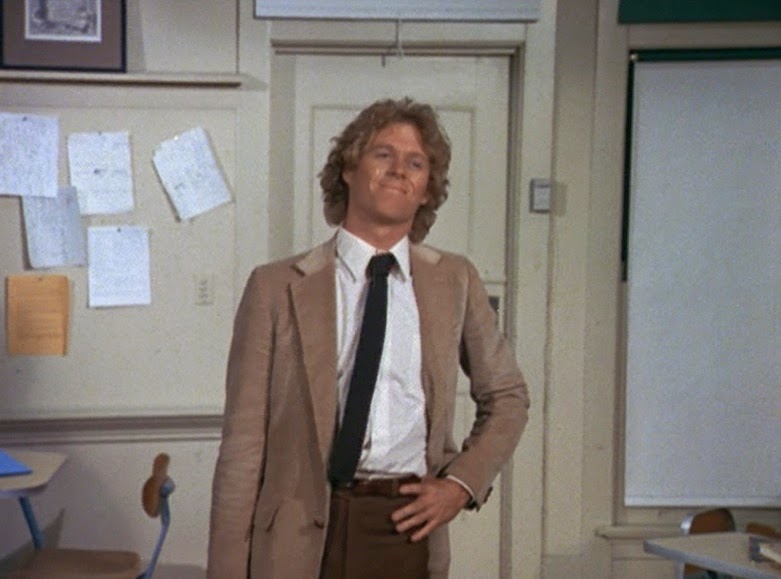The Greatest American Hero (1981 - 1983) features one of the best, catchiest, and most memorable theme songs in all of TV history.
"Believe it or Not" was composed by Mike Post and Stephen Geyer, and sung by Joey Scarbury. The song was a pop culture phenomenon and reached #2 on the Billboard charts in August of 1981.
The song has also had a remarkable second life, "guest-starring" in everything from Michael Moore's Fahrenheit 9/11 (2004) and Mystery Science Theater 3000 ("The Pumaman") to The Following (2013).
Here, "Believe it or Not" adds significantly to the series introductory montage, capturing perfectly the mood of the images, and also of the series as a whole.
The Greatest American Hero concerns a gentle, put-upon single father and high-school teacher, Ralph Hinckley (William Katt) who is gifted with a superhero suit by benevolent aliens.
But Ralph almost instantly loses the instruction manual to the suit, and this fact results in a lot of trial and error as his life is turned upside down by his new-found abilities and the pressure to use them responsibly (and correctly).
The introductory montage recounts Ralph's origin story (bracketed in book-end images of the alien spaceship), but also captures the humorous aspects of the tale.
We start with images of an approaching alien ship. It is night time, and the well-lit ship approaches the parked car of Bill Maxwell (Robert Culp), who is seated inside with Ralph.
The alien ship sends down a beam of light...and presents a gift to all mankind, but for Ralph in particular.
Next we see the brightly-colored super suit, in the alien container or box, and experience Ralph's confusion/wonder/curiosity as he regards it. This suit, quite clearly, is going to change everything.
The freeze frame (title) image captures his mood, as he holds the alien-made suit.
After the image of the grand sounding title, which marks Ralph as the best of all protagonists (and a patriotic one to boot), we get a funny juxtaposition: his gag reel, essentially, as he learns to fly.
We see a close-up of his face as he expresses terror in mid-air.
In sequence, we then see Ralph fly into a wall, land in the dirt, celebrate (mockingly) his new identity as a super hero, and ham-handedly attempt a covert operation in a trench coat.
The Greatest American Hero? More like a fumbling one...
Next, a shaky take-off and and another rocky flight.
But then the images change to reveal how the suit has also altered Ralph's professional life.
Faced with unruly students, he uses his mighty strength to slam a chair to the floor, grabbing their attention, and putting the pause button on their frissons.
For all his failures as "the greatest American hero," the suit grants Ralph additional confidence in his comfort zone: the classroom.
The final shot of this sequence reveals Ralph's satisfaction at having found a way, at last, to get the attention of his students.
The images below qualify as both literal and metaphorical. Ralph crashes into a wall and smashes his head.
Being a superhero is, literally, a head-ache, according to these images. It certainly is for Ralph, who wishes to have some semblance of a normal life.
As Ralph hits the ground and massages his head, we meet our star: William Katt.
Next we are introduced to Ralph's professional back-up, and a great TV character: Robert Culp's Bill Maxwell, cranky FBI agent.
The images showcasing the introduction of the character and the actor focus on action and adventure. He drives a car quickly, fires his gun at a bad guy, flashes a trademark grin and expresses a bit of frustration (probably at Ralph, his recalcitrant trainee...).
Last but not at all least, we meet the third point in our heroic triangle, Connie Sellecca's Pam.
She is an attorney and Ralph's girlfriend. Like Bill, she has an attitudinal side, but her heart (and her acerbic wit) is in the right place. The series would not be complete without the skills and knowledge she brings to the table.
The remainder of the montage features images of Ralph using his powers. We see him startling Pam, materializing in a car (using invisibility) next to Bill, surprising even himself. We also see him in action, arguing with Bill, and undertaking action with him.
Finally, our book-end imagery: The alien ship, and Ralph's sense of wonder at seeing it. This is the moment that changed his life. And if you were watching ABC the night The Greatest American Hero first aired (March 18, 1981) your life might have changed too!
To me, The Greatest American Hero is all about leaving (or being forced out of...) your comfort zone, and teaching yourself to do something you don't think you are capable of. It's important that Ralph is a teacher in the series, since he has dedicated his life to helping others learn this lesson. He is thrown a curve-ball, however, when he must learn the same lesson in his own life.
Below, the opening montage in action.













































No comments:
Post a Comment